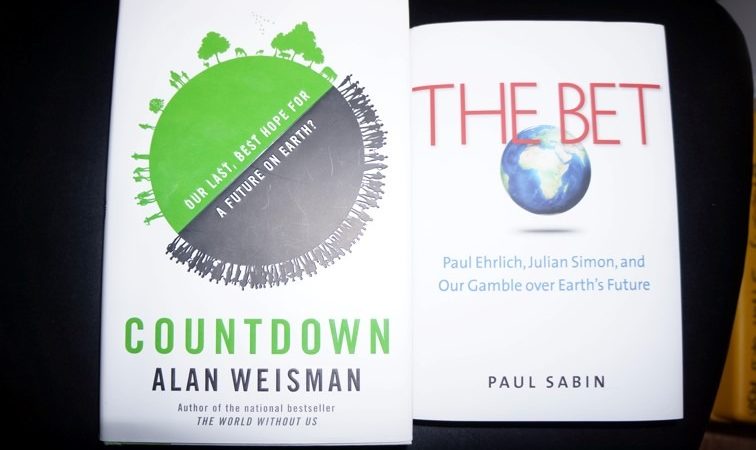If you’re lucky enough to grow old, you have the privilege of being commented on by historians. That happened to me recently with the publication of “The Bet: Paul Ehrlich, Julian Simon, and Our Gamble Over Earth’s Future” by Yale historian Paul Sabin. Sabin has written a very readable, literate, and factual description of the bet that John Harte, John Holdren, and I made with Julian Simon a long time ago. I found it a very interesting read and especially liked Sabin’s attempt to put the bet into the political context of the time.
I thought it even might lead to some diminution of the right-wing habit of claiming that Simon was right and there are no serious population, resource, environment problems because we lost the bet. Sabin did point out that had the bet gone on a little longer we would have won, but somehow the reviewer in the Wall Street Journal seems to have missed that point, and said Simon’s view that resources are infinite has been “vindicated.” That reviewer complained because I have called people like Inhofe, Limbaugh, and the reviewer “morons” for working hard to kill my (and their) descendants while profiting themselves and their pimps. I apologize for my self-censorship, but the more accurate 7-letter and 12-letter descriptors are considered bad form by most editors.
Of course, being the focus of so much attention meant it was inevitable I’d find something about the book annoying. Amazingly, it was its much-praised even-handedness. Sabin seemed at pains to make the views of a professor of mail-order marketing, who believed that the only limit to the copper available to Homo sapiens is “the weight of the universe” and that humanity can enjoy economic growth for “seven billion years,” seem to be equivalent to those of the entire scientific community. It’s noteworthy that the truth in scientific disputes almost never lies in the middle. There is no “ether breeze.” Earth doesn’t circle the sun in spring and summer while the sun circles Earth in the other seasons. Plants evolve but animals are specially created. The book reminded me somewhat of an argument climatologist Steve Schneider and I had with the Washington Post’s famous editor Ben Bradlee, who claimed that he didn’t want his reporters to know anything about science so their reporting could be “balanced.” He largely succeeded there, but strangely he kept hiring sports reporters who knew a strike from a ball.
Alan Weisman suffers from no such “the truth lies in the middle” delusions. His brilliant book “Countdown: Our Last, Best Hope for a Future on Earth?” makes crystal clear why Julian Simon’s views bordered on the insane. Most intelligent people know intellectually that neither the global population nor the economy can grow forever. But after reading Weisman’s in-depth examination of the population situation, they will know it emotionally. Countdown takes the reader around the world, stopping to examine topics ranging from the profligate reproductive habits of Orthodox Jews in Jerusalem and Ronald Reagan’s war on women to Bangkok’s “Cabbages and Condoms” restaurant, representative of the campaign that started Thailand on the road to eventual population shrinkage, and Malcolm Potts’ war to empower women. Although I have spent more than six decades examining the demographic situation, I found many new (to me) gems in the rich text. My favorite is a quote from the future Pope John Paul (p. 130-131), pointing out that the Church dared not admit that its rules against contraception “had condemned thousands of innocent human acts, forbidding under pain of eternal damnation, a practice that would now be sanctioned.” In Humanae Vitae that condemnation was continued, with its awful consequences for individuals and humanity as a whole, rather than admit the obvious – that Popes are just as fallible as other human beings.
Weisman, a first rate reporter whose earlier book, The World Without Us, is already a classic, is not constrained by nutty ideas of “balance.” He concludes “…we either take control ourselves, and humanely bring our numbers down by recruiting fewer new members of the human race to take our places, or nature is going to hand out a pile of pink slips.”
MAHB-UTS Blogs are a joint venture between the University of Technology Sydney and the Millennium Alliance for Humanity and the Biosphere. Questions should be directed to joan@mahbonline.org.
MAHB Blog: https://stagingphp.com/mahb/blog/population-books/
The views and opinions expressed through the MAHB Website are those of the contributing authors and do not necessarily reflect an official position of the MAHB. The MAHB aims to share a range of perspectives and welcomes the discussions that they prompt.
